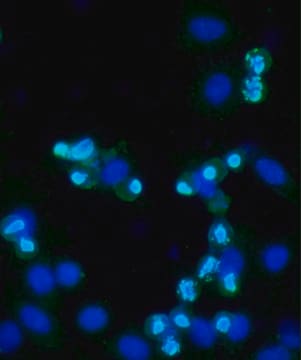475949
NMS-P715
≥98% (HPLC), powder, MPS1 inhibitor, Calbiochem®
Synonyme(s) :
MPS1 Inhibitor, NMS-P715, (N-(2,6-diethylphenyl)-1-methyl-8-({4-[(1-methylpiperidin-4-yl)carbamoyl]-2-(trifluoromethoxy)phenyl}amino)-4,5-dihydro-1H-pyrazolo[4,3-h]quinazoline-3-carboxamide)
About This Item
Produits recommandés
Nom du produit
MPS1 Inhibitor, NMS-P715, The MPS1 Inhibitor, NMS-P715 controls the biological activity of MPS1. This small molecule/inhibitor is primarily used for Phosphorylation & Dephosphorylation applications.
Niveau de qualité
Essai
≥98% (HPLC)
Forme
powder
Fabricant/nom de marque
Calbiochem®
Conditions de stockage
OK to freeze
protect from light
Couleur
white
Solubilité
DMSO: 10 mg/mL, clear, colorless
Conditions d'expédition
ambient
Température de stockage
2-8°C
Chaîne SMILES
CN(N=C1C(NC2=C(CC)C=CC=C2CC)=O)C3=C1CCC4=C3N=C(NC5=CC=C(C(NC6CCN(C)CC6)=O)C=C5OC(F)(F)F)N=C4
Clé InChI
JFOAJUGFHDCBJJ-UHFFFAOYSA-N
Description générale
Conditionnement
Avertissement
Reconstitution
Autres remarques
Colombo, R., et al. 2011. Cancer Res.70, 10255.
Informations légales
Code de la classe de stockage
11 - Combustible Solids
Classe de danger pour l'eau (WGK)
WGK 2
Point d'éclair (°F)
Not applicable
Point d'éclair (°C)
Not applicable
Certificats d'analyse (COA)
Recherchez un Certificats d'analyse (COA) en saisissant le numéro de lot du produit. Les numéros de lot figurent sur l'étiquette du produit après les mots "Lot" ou "Batch".
Déjà en possession de ce produit ?
Retrouvez la documentation relative aux produits que vous avez récemment achetés dans la Bibliothèque de documents.
Notre équipe de scientifiques dispose d'une expérience dans tous les secteurs de la recherche, notamment en sciences de la vie, science des matériaux, synthèse chimique, chromatographie, analyse et dans de nombreux autres domaines..
Contacter notre Service technique







